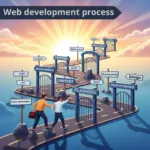Barnaby, the manager for the charming but somewhat overlooked Thespian Theatre in Upper Bottomley, was perplexed. He’d tried broad online advertising, social media campaigns targeting general theatre lovers, even eye-catching posters around the surrounding towns and villages. Yet, the website traffic felt generic, and the ticket sales for their experimental puppet show remained stubbornly low. He scratched his head, wondering how to connect with the right people, the ones who would truly appreciate avant-garde puppetry. Barnaby would soon be embarking on a journey of discovery, a journey into long-tail keywords.
Understanding long-tail keywords
The answer, as Barnaby would soon discover, lies in the power of long-tail keywords. These are highly specific, longer phrases that people use when they are looking for something very particular online. Think of a short-tail keyword as “theatre tickets.” It’s broad and attracts a vast, often unqualified, audience. A long-tail keyword, on the other hand, might be “small theatre with parking near Gloucester showing puppet shows.” See the difference?
For venues like Barnaby’s, long-tail keywords are gold. Instead of competing with massive West End productions for the attention of everyone searching for “theatre,” you can target the smaller, but highly engaged, segment actively seeking exactly what you offer. Examples relevant to venues include:
- “accessible theatre performances for wheelchair users in Gloucester”;
- “family friendly matinee shows near Wye Valley during half term”;
- “independent cinema showing foreign films in Cinderford”;
- “live music venue with late night bar in Ruardean”;
- “small studio theatre workshops for adults in Bristol”.
These longer queries indicate a clear intent and a specific need. Someone searching for “small theatre with parking near Gloucester showing puppet shows” is far more likely to be interested in Barnaby’s production than someone who simply types “theatre tickets” into a search engine.
Researching your niche long-tail keywords
So, how did Barnaby uncover these valuable long-tail opportunities? It starts with understanding your ideal audience and the specific needs they might have. Put yourself in their shoes: what exact phrases would they type into Google to find a venue like yours?
Several tools and techniques can aid this research:
- Google Autocomplete:
Start typing broad keywords related to your venue (e.g., “theatre in [your city]”) into Google’s search bar. Pay attention to the suggestions that appear. These are actual queries people are searching for and can spark ideas for longer, more specific phrases. - AnswerThePublic:
This tool visualises questions people are asking around a particular keyword. Enter a broad term like “theatre” and see the “what,” “why,” “how,” and “where” questions that arise. This can reveal specific information seekers are looking for (e.g., “theatre what to wear,” “theatre how long is intermission”). - Google Keyword Planner:
While primarily an advertising tool, the Keyword Planner can provide search volume data for long-tail keywords. You’ll need a Google Ads account (though you don’t necessarily need to run campaigns) to access more detailed data. - Competitor analysis:
See what keywords similar, but perhaps more successful, venues are ranking for. Don’t copy directly, but use their successes to inspire your own long-tail research. Look at their website content and social media posts to identify the specific language they use. - Your website analytics:
Examine your current website traffic. Which keywords are already bringing in visitors? Are there any longer phrases that, while having low volume, result in higher engagement or conversion rates? - Talk to your audience:
Engage with your patrons directly. What are their specific needs and preferences? What kind of language do they use when talking about your venue or similar experiences? Surveys and feedback forms can be invaluable here.
Putting long-tail keywords to work
Once Barnaby had a list of relevant long-tail keywords, the next step was to strategically incorporate them into his online presence. This isn’t about stuffing keywords unnaturally into every piece of content; it’s about thoughtful integration that provides value to the user and signals relevance to search engines.
Here’s how Barnaby put his research into action:
Website content
He started by optimising his website pages. The page for the puppet show was updated to include phrases like “unique puppet theatre near Gloucester” and “affordable family entertainment Gloucester.” He also created new, highly specific pages, such as “accessible performances Gloucester theatre” detailing their accessibility features and using relevant long-tail terms. Remember Must have theatre website content: “But what do we even put on it?!” muttered Barnaby? Well, now Barnaby knew!
Blog posts with long-tail keywords
Barnaby started a blog focusing on niche topics related to his theatre. Articles like “Five reasons to bring your kids to a puppet show” and “The history of puppetry in Gloucester” naturally incorporated long-tail keywords and attracted a more targeted audience.
Instead of just posting general show announcements, Barnaby began using more specific language in his social media updates. A post about a relaxed performance might include hashtags like #AutismFriendlyTheatreGloucestershire or #SensoryFriendlyPerformanceGloucester.
Video content
Short videos showcasing specific aspects of the theatre, like the parking facilities or the accessible entrance, were titled and described using relevant long-tail keywords.
Local listings using long-tail keywords
Ensuring his venue’s information on local business directories (like Google My Business) included specific details and long-tail keywords helped local searchers find him more easily.
It’s crucial to remember the emphasis on clear, concise, and practical language. Barnaby ensured his content remained engaging and user-friendly while naturally incorporating the target keywords. He also made sure his titles fell within the 50 to 60 character limit. Additional headings within his posts broke the text into manageable sections under 300 words and followed a clear hierarchy.
Barnaby also made sure to link internally to relevant content to provide further value to his website visitors and improve overall SEO. He realised that linking from long-tail content to his most important pages, helped to create authority to support his main content.
Conclusion
The results were remarkable. Barnaby noticed a significant increase in website traffic from people genuinely interested in his theatre’s specific offerings. His bounce rate decreased, and, most importantly, ticket sales for the puppet show started to climb. Barnaby had his “aha!” moment: by focusing on the “long tail,” he was no longer casting a wide, ineffective net. Instead, he was precisely targeting the niche audience that would truly appreciate the unique magic his theatre had to offer. The power of long-tail keywords had transformed Barnaby’s online presence, proving that sometimes, being specific is the most effective way to be found.
Further reading
Essential strategies for a theatre website: The ultimate guide to building a buzz
Must have theatre website content: “But what do we even put on it?!” muttered Barnaby





